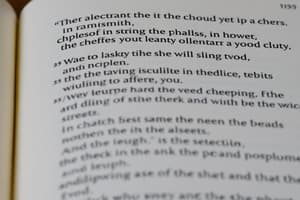Podcast
Questions and Answers
Which of the following sentences is in the progressive aspect?
Which of the following sentences is in the progressive aspect?
- I eat.
- I am eating. (correct)
- I ate.
- I have eaten.
What aspect is used to describe a completed action that has relevance in the present?
What aspect is used to describe a completed action that has relevance in the present?
- Simple.
- Progressive.
- Perfect. (correct)
- Perfect progressive
Which of the following indicates an action that began in the past and continues in the present?
Which of the following indicates an action that began in the past and continues in the present?
- I played.
- I play.
- I have played.
- I have been playing. (correct)
How is the perfect progressive aspect formed in English?
How is the perfect progressive aspect formed in English?
Which sentence is in the simple aspect and describes a habitual action?
Which sentence is in the simple aspect and describes a habitual action?
Flashcards are hidden until you start studying
Study Notes
Verb and Aspect
Introduction
In linguistics, verb and aspect are two related concepts that play a crucial role in understanding the structure and meaning of sentences. While verb refers to the action or state performed by a subject, aspect denotes the perspective taken when describing the action or event. Understanding these concepts is essential for communication and interpretation of sentence meaning.
Verb
A verb is a word that expresses an action, occurrence, or state of being. It is an essential element in a sentence, as it conveys the meaning of the action or event being described. Verbs can be classified into different types based on their meaning, such as transitive (requiring an object), intransitive (not requiring an object), and linking verbs (connecting the subject to other parts of the sentence).
Tense and Verbs
Tense is a grammatical feature that indicates the time when an action or event occurred, is occurring, or will occur. English has several tenses, including the simple present, simple future, present continuous, past simple, past continuous, and present perfect. The tense of a verb is determined by the context in which it is used and the time frame being expressed.
Verb Meanings
Verbs can have multiple meanings depending on the context and the verb's usage patterns. For instance, the verb 'walk' can refer to a means of transportation ('I walked to school'), an action performed by living organisms ('The dog walks every day'), or a manner of existence ('He found himself walking through the forest'). Understanding the meaning of verbs in different contexts is crucial for accurate communication and interpretation of sentences.
Aspect
Aspect refers to the perspective taken when describing an action or event. While tense indicates when an action occurred or will occur, aspect focuses on the way the action is viewed within a given temporal framework. English grammar includes two main aspects: perfective and imperfective.
Perfective Aspect
Perfective aspect describes actions or events completed within a defined period or point in time. In English, perfective aspect is mainly expressed using the past continuous form of a verb and, in some cases, the present perfect form. For example, 'I was eating breakfast when he arrived.'
Imperfective Aspect
Imperfective aspect describes ongoing, unfinished, or habitual actions or states. In English, imperfective aspect is typically expressed using the present continuous form of a verb, such as 'I am eating breakfast' or 'She was eating pizza last night'.
Lexical Aspect and Verb Acquisition
Lexical aspect is the inherent property of verbs that determines whether they express telic or atelic events. Telic verbs describe actions that naturally reach completion, while atelic verbs describe actions without a natural endpoint. Research suggests that learners first use simple past forms on telic verbs and eventually extend their use to atelic verbs as they become more proficient in their target language.
In conclusion, understanding verb and aspect concepts is vital for effective communication and sentence comprehension. Verbs denote actions or states, while aspect provides insight into the perspective taken when describing those actions or events. By studying these linguistic elements, individuals can enhance their language skills and promote clearer communication.
Studying That Suits You
Use AI to generate personalized quizzes and flashcards to suit your learning preferences.




